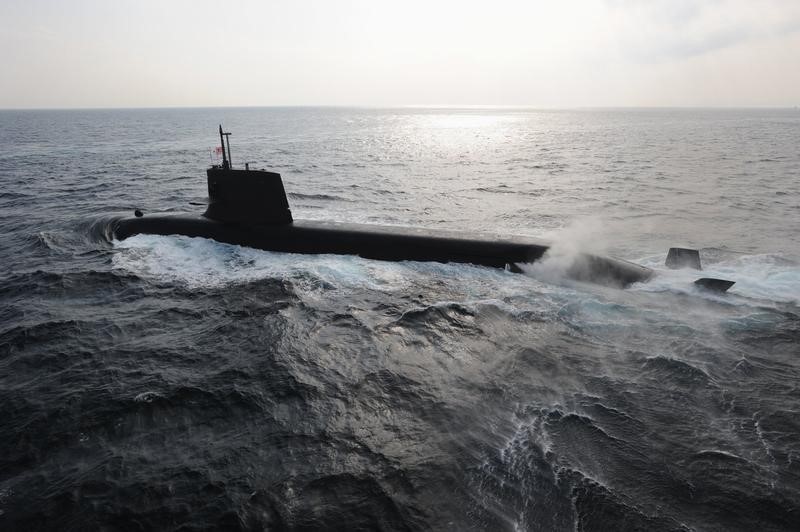* Japan had been seen as frontrunner for Australian submarine deal
* But Australian defence firms unhappy after talks with Japan
* Say Japan won't discuss specific collaboration possibilities
* Tokyo defends bidding approach, says sticking to rules
* Canberra says such talks allowed, as long as no deals signed
By Matt Siegel
SYDNEY, Sept 1 (Reuters) - A Japanese consortium eyeing a A$50 billion ($35.68 billion) contract to build submarines for Australia irked local suppliers by failing to share key information about its proposal or discuss specific collaboration possibilities during a visit last week, executives at Australian firms said.
The apparent missteps underscore Japan's inexperience in bidding for global defence deals after Prime Minister Shinzo Abe ended a decades-old ban on weapons exports last year as part of his more muscular security agenda.
Japanese defence officials and executives from Mitsubishi Heavy Industries 7011.T and Kawasaki Heavy Industries 7012.T visited Adelaide, an Australian ship-building hub, to lobby for one of the world's most lucrative defence contracts.
The consortium's unwillingness during the trip to commit to building the 12 submarines in Australia, where manufacturing jobs are a hot-button political issue, was criticised by local politicians and labour unions.
Adding to the view among experts that Japan has lost ground to European rivals after once being seen as the frontrunner for the deal was the delegation's refusal to discuss the process by which local suppliers could propose collaboration on the project.
At a briefing open to the media last Wednesday for scores of manufacturers, Rex Patrick, an Australian defence expert, asked the delegation how potential suppliers could engage with the delegation privately to explore cooperation opportunities, a practice experts told Reuters was common and expected.
The Japanese delegation responded by saying that discussing such "teaming" arrangements before the contract was awarded was not allowed under the bidding process.
However, Rear Admiral Greg Sammut, head of the Future Submarine Program at the Australian Department of Defence, told Reuters that while bidders were not allowed to sign exclusive deals with suppliers during bidding, specific talks about future collaboration were fine.
"This doesn't prevent any of the participants from engaging with industry and talking to industry about their capability and how they might be able to collaborate in the future," Summut said by telephone from Canberra.
Three Australian defence contractors who attended the briefing told Reuters that talks on specific collaboration were essential, adding they were rebuffed when they sought one-on-one meetings.
The Japanese presentation also lacked key details, they said.
In particular, the delegation had not shared information on which submarine components might be open to Australian manufacturers to supply, they added.
The executives, from companies that make precision pumps to advanced surveillance and weapons systems, declined to be identified for fear of jeopardising their chances in winning work on the project.
By comparison, ThyssenKrupp Marine Systems (TKMS) TKAG.DE of Germany and France's state-controlled naval contractor DCNS have said they would build the submarines entirely in Australia. They have also courted the Australian defence industry and said their bids would detail local supply chain involvement.
"I don't think (the Japanese) have any idea how to engage. TKMS and DCNS have done this in ... lots of places (around the world)," said the director of one local defence contractor who attended the briefing.
Japan has declined to commit to an Australian build, citing rules requiring each of the bidders to provide three estimates: one for construction overseas, one for a partial assembly in Australia and one for a full build in an Australian shipyard.
Time is running out for Japan, with an expert advisory council expected to deliver its recommendation on the bids to the Australian government in November.
JAPAN BELIEVES VISIT WENT WELL
Members of the Japanese delegation insisted the visit went well.
An official from the Ministry of Economy, Trade and Industry said the delegation met potential suppliers.
"We were able to discuss possible future cooperation with Australian companies, although Australian government rules meant we weren't allowed to discuss specific corporate partnerships," the official told Reuters, adding the delegation was considering holding similar events in other Australian cities.
A Japanese Defense Ministry official said a room was set aside after Wednesday's open briefing for follow-up questions.
The official said he spoke to several Australian suppliers and explained to each of them matters such as the conditions for partnering with Japan on the submarine deal.
The three Australian executives said they were not aware of this subsequent opportunity to talk to the delegation.
Jessica Thomas, a spokeswoman for DCNS in Australia, said the French contractor had held discussions with Australian industry to understand local capabilities.
"It would be impossible to submit a compliant (bid) ... without such broad ranging industrial engagement," she said.
The European bidders had held multiple one-on-one meetings of the kind Japan said were against the rules, defence expert Patrick told Reuters.
Patrick is also an advisor to influential independent Senator Nick Xenophon, who in July met with Japanese officials in Japan to push for a local build.
"The Japanese will have done none of this and so will not be in a position to even understand what is possible with respect to Australian industry involvement, nor appreciate the cost and risk," Patrick wrote in an article for the influential Australian Strategic Policy Institute to be published later this week. ($1 = 1.4013 Australian dollars)
